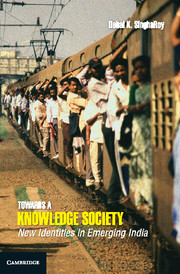Book contents
- Frontmatter
- Contents
- List of Tables and Figures
- Preface
- 1 Introduction: Conceptualising Knowledge Society: Critical Dimensions and Ideal Image
- 2 Critiquing and Contextualising Knowledge Society
- 3 Strategising for Knowledge Society in India: The Shifting Backdrops and Emerging Contexts
- 4 Education for Knowledge Society in India
- 5 Information and Communication Technologies for Knowledge Society
- 6 Indian Growth Story: Service and Knowledge Dynamics
- 7 Education, ICTs and Work: The Divergent Empirical Reality
- 8 Knowledge Society: Work, Workers and Work Relations
- 9 Knowledge Society: Culture, Continuity and Contradictions
- 10 Conclusion: Marginality, Identity, Fluidity and Beyond
- Bibliography
- Index
3 - Strategising for Knowledge Society in India: The Shifting Backdrops and Emerging Contexts
Published online by Cambridge University Press: 05 August 2014
- Frontmatter
- Contents
- List of Tables and Figures
- Preface
- 1 Introduction: Conceptualising Knowledge Society: Critical Dimensions and Ideal Image
- 2 Critiquing and Contextualising Knowledge Society
- 3 Strategising for Knowledge Society in India: The Shifting Backdrops and Emerging Contexts
- 4 Education for Knowledge Society in India
- 5 Information and Communication Technologies for Knowledge Society
- 6 Indian Growth Story: Service and Knowledge Dynamics
- 7 Education, ICTs and Work: The Divergent Empirical Reality
- 8 Knowledge Society: Work, Workers and Work Relations
- 9 Knowledge Society: Culture, Continuity and Contradictions
- 10 Conclusion: Marginality, Identity, Fluidity and Beyond
- Bibliography
- Index
Summary
The Changing Landscape
The processes of generation, accumulation and use of knowledge have remained integral parts of Indian society since the very inception of its civilisational journey that started thousands of years ago. However, a vast body of this knowledge has remained in the realm of spiritualism that looks for salvation and discovery of inner truth embodied in the nature and in human beings. These have remained integrated for long, more with the cognition, morality and ethics, and less with application for economic and societal development. Moreover, this body of knowledge, especially the process of acquiring and getting access over it, remained more restricted for limited few and got less disseminated among the common mass. The civilisational journey of India that has been shaped by the inheritance of this vast body of knowledge is seldom matched by their mass application.
India has produced local varieties of men/women of wisdom in the nooks and corners of the country having significant command over knowledge of weather, land, water, forest, health, behaviour of plant, animal and human being, localised cropping patterns, indigenous medicine, strategy for protection against natural disasters and the like. They, however, have neither emerged to be scientists in the formal sense of the term nor the process of acquiring this localised expertise has become a part of scientific learning due to the lack of systematisation, transmission, experimentation and application of this knowledge.
- Type
- Chapter
- Information
- Towards a Knowledge SocietyNew Identities in Emerging India, pp. 65 - 93Publisher: Cambridge University PressPrint publication year: 2014



